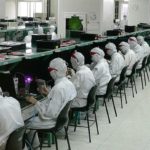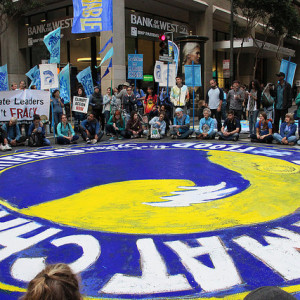Art beyond oil: on Ai Weiwei, Ali Ferzat and Ahmed Bassiouny
‘Not if but when: Culture Beyond Oil’ is a new publication from PLATFORM, Liberate Tate, and Art Not Oil which sets out to discuss oil sponsorship of the arts. In the excerpt below, Mel Evans from Platform considers the political plight of three artists who in the practice of their work have experienced state-led persecution, looking at the role of an international arts community in speaking up for the human rights of artists. You can buy the full limited edition publication which features artworks in dialogue with the BP Gulf of Mexico disaster for only £10. Hurry while stocks last.
Ai Weiwei is a Chinese contemporary artist whose politically engaged work, ranging from sculpture to photography, has been exhibited in modern art galleries around the globe. Famed for Birds Nest, the stadium of the Olympic Games in Beijing, other notable works include: Remembering, exhibited in So Sorry at Haus der Kunst in Munich 2009-10; and Sunflower Seeds, exhibited in the Tate Modern Turbine Hall in 2011. Remembering, constructed from 9,000 children’s rucksacks, was made in response to the Chinese earthquake of 2008. Shocked by the loss of children’s lives caused by badly built government buildings and schools, So Sorry was a direct attack on the rhetoric of governments and corporations whose empty apologies mask their own negligence.
During the exhibition of Sunflower Seeds Ai Weiwei was arrested at Beijing airport on 3 April 2011. By 4 April, both Weiwei and his friend Wen Tao were missing, and their homes searched; freeaiweiwei.org chronicles the ensuing struggles and intimidation of their families and colleagues. The week following Ai Weiwei’s incarceration, Tate inscribed ‘Release Ai Weiwei’ at the top of the Turbine Hall that contained his exhibit. Tate also started a online campaign for his release and led a petition alongside the Guggenheim and numerous modern art galleries around the world that was signed by over 140,000 people. Ai Weiwei was released on 22 June 2011, under continued threat of imprisonment for alleged subversion. Citing restrictions on speaking to journalists, Weiwei released a commentary to the press, which included this description of his situation:
“My ordeal made me understand that on this fabric, there are many hidden spots where they put people without identity. Only your family is crying out that you’re missing. But you can’t get answers from the street communities or officials, or even at the highest levels, the court or the police or the head of the nation.”
In the case of Ai Weiwei, Tate assumed a position on human rights by speaking up for an artist. It demonstrated an effective capacity to mobilise global backing and give space for an international art community to take action in support of a member of its own network. Tate’s action does nonetheless beg the question of how would it respond if its principle sponsor had been a financial backer of the repressive government? There are two other recent cases in which artists were persecuted by their homeland state, who did not receive the same level of attention as Ai Weiwei: Ali Ferzat and Ahmed Bassiouny. The governing regimes in their respective countries, Syria and Egypt had close ties with Shell (Syria) and BP (Egypt). The readiness of Tate and other galleries to criticise the Chinese government’s treatment of Ai Weiwei, although to be applauded, is undermined by their complicity, through sponsorship, with the oil companies that hold close ties with oppressive regimes persecuting artists in other countries.
Ali Ferzat is a prominent political cartoonist whose political cartoons and caricatures had targeted dictators across the Middle East. Appearing in Syrian daily newspapers for decades his work won him first prize in the Intergraphic International Festival in Germany, 1980, as well as death threats from Saddam Hussein. He was featured regularly in the French newspaper Le Monde whilst being banned in Iraq, Jordan and Libya. Initially encouraged by Syrian President-to-be Bashar Assad, Ferzat established the first independent periodical al-Domari (‘The Lamplighter’) in the wave of reforms opened by Assad as he took control of Syria in 2000; by 2003 al-Domari was forced to close due to repeated government censorship. Following that, Ferzat became a vehement critic of the Assad regime. When the Syrian uprising began in March 2011, Ferzat’s satire fiercely condemned the military’s brutal crackdown on the Syrian protest movement. In August 2011 Ali Ferzat was beaten and had his hands broken by masked gunmen. The attack on the artist was described on the Facebook page of the US Embassy in Damascus as a “government-sponsored, targeted, brutal attack.”
Shell’s relationship with Assad’s regime has remained strong throughout 2011. In May 2011, when over a thousand people had been killed and more than ten thousand imprisoned in Syria during the popular uprising, Shell was sending a tanker to collect 600,000 barrels of crude oil worth $55 million from the state company. 17% of Syrian tanks – instrumental in the repression of the uprising – run on fuel derived from Shell crude. Shell has also promoted its political support of the regime on a number of occasions. Shell’s Deputy General Manager in Syria has repeatedly praised the Syrian regime in terms that equate Assad’s regime with the Syrian people: “This success could not have been achieved without the strong partnerships that have been developed over the years between Shell and the Government of Syria. We believe that the relationship Shell has with the Government and the Syrian people is mutually beneficial.”
Currently the Southbank Centre, the National Theatre the Science Museum and the National Gallery accept sponsorship from Shell, amongst several other cultural institutions in London.
Ahmed Bassiouny was a young arts professor, sound and visual artist and musician whose work was considered significant in a new generation of Egyptian artists. Bassiouny was killed during street protests on 28 January 2011, just days into the mobilisations that sparked the Egyptian revolution. Bassiouny had won a painting prize in 2001, and proceeded to explore more experimental forms, looking at digital interactive media, and participating in ‘Egypt Lab’ with Medrar Contemporary Art Foundation in Egypt and the Hangar Foundation in Barcelona. His music was to feature at SONAR Festival in Barcelona 2011.
Ahmed Bassiouny’s multimedia work 30 Days of Running in Place was profiled in the Egyptian pavillion at the Venice Biennale, 2011; the work was presented alongside footage shot by Bassiouny of the events on the streets of Cairo from 25 – 28 January 2011.
While on the streets in Cairo, Ahmed Bassiouny was killed by armed police. He was one of the 846 people to be killed during the 18 days of protests that led to President Hosni Mubarak’s resignation on 11 February 2011. The millions that took to the streets of Cairo, Alexandria and Suez were furious at Mubarak for upholding his own interests and those of Western powers and foreign companies at the expense of the Egyptian people.
For decades, British and American oil companies worked hand in glove with the Egyptian dictatorship, enjoying its ‘stability’ (lack of democratic change), ‘security’ (repression of dissent) and ‘favourable business environment’ (neoliberal policies and restrictions on trade unions). BP was always particularly proud of its “strong relationships with the Egyptian government”, boasting that it was the single largest foreign investor in the country and responsible for almost half of Egypt’s entire oil production, easily overshadowing all competitors. BP continued to extract crude and underwrite repression throughout more than four decades of Emergency Law, investing over $17 billion in oil rigs and pipelines. Billions of dollars in revenue payments enabled Mubarak to build up and arm both his civil and paramilitary police forces and the army.
During the uprising, BP’s website carried no comment on the democratic protests or the regime’s attempts at repression, referring only to “the ongoing unrest in Egypt” and evacuation plans. Meanwhile, drilling and extraction operations continue unabated, with most oil facilities located out of reach of normal street protests. BP assumed that Egypt’s strong army would guarantee the security integrity of its assets, and continued to pay revenues to and underwrite a regime widely accepted as illegitimate.
The British Museum’s BP Special Exhibition The Ancient Egyptian Book of the Dead opened just 3 months before the protests that sparked the Egyptian revolution that began on 25 January 2011.
The correlation of the popular uprising with the BP special exhibition at the British Museum, albeit a coincidence, makes a striking example of the dissonance created by the presence of international oil companies in cultural institutions. It is moments like the Egyptian uprising, when the world’s attention was turned to the Mubarak dictatorship and all who supported it, that BP needs this positive advertising the most.
The tacit support of BP by these institutions is, to some artists, cultural workers, Tate members and visitors, utterly unacceptable. The position on this issue by the three featured artists who have faced persecution is unknown, but nonetheless these cases serve to emphasise the problematic proximity between art galleries who continue to accept sponsorship from BP or Shell, and the human rights violations they themselves would condemn. The sun will set on oil sponsorship of the arts; but for now the galleries remain seriously compromised by the morally bankrupt practices of oil companies.
You can browse the full document here (and remember to buy it!):




Leave a Reply